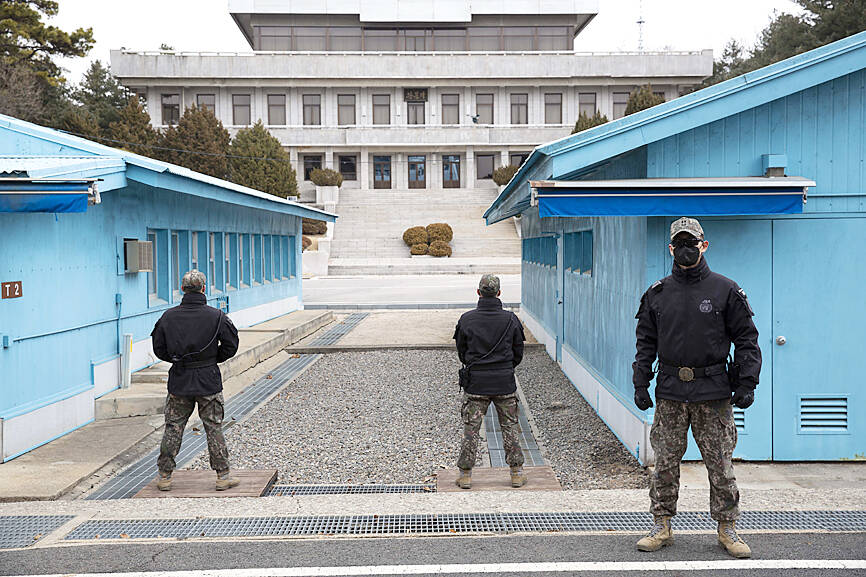North Korea has not responded to the regularly held inter-Korean calls for the third consecutive day, elevating tensions on the peninsula and raising concerns about the stability of the region.
Officials in North Korea were unresponsive to the regular phone communication between the two sides yesterday, Yonhap News reported, after calls through the military line went unanswered on the previous two days.
The two Koreas typically hold phone calls twice a day, including a cross-border liaison channel.

Photo: AP
South Korean Ministry of National Defense officials said they reached out to the North through the military hotline at 9am yesterday, but the calls went unanswered, Yonhap said.
The suspension of communication comes amid heightened tensions on the Korean Peninsula following North Korea’s recent weapons tests, which were seen as a response to joint military drills between South Korea and the US.
North Korean state media reported on Saturday that the country staged an underwater detonation test of its “Haeil-2” nuclear-capable attack drone last week.
The drone cruised off North Korea’s east coast for more than 71 hours before its test warhead was detonated underwater, the Korean Central News Agency said.
North Korea’s lack of response could be a precursor to military exercises by the regime. In August 2017, North Korea did not respond to South Korea’s request for talks a few days before it launched a ballistic missile over Japan.
The inter-Korean hotline was restored in July 2021, after being ignored for about a year by the North in protest of leaflets dropped via balloon by South Korean activists, containing criticisms of Pyongyang.
Daily phone call disruptions have not always resulted in tensions. In June last year, North Korea did not respond to a hotline call, apparently due to technical problems caused by heavy rains.

‘TAIWAN-FRIENDLY’: The last time the Web site fact sheet removed the lines on the US not supporting Taiwanese independence was during the Biden administration in 2022 The US Department of State has removed a statement on its Web site that it does not support Taiwanese independence, among changes that the Taiwanese government praised yesterday as supporting Taiwan. The Taiwan-US relations fact sheet, produced by the department’s Bureau of East Asian and Pacific Affairs, previously stated that the US opposes “any unilateral changes to the status quo from either side; we do not support Taiwan independence; and we expect cross-strait differences to be resolved by peaceful means.” In the updated version published on Thursday, the line stating that the US does not support Taiwanese independence had been removed. The updated

‘CORRECT IDENTIFICATION’: Beginning in May, Taiwanese married to Japanese can register their home country as Taiwan in their spouse’s family record, ‘Nikkei Asia’ said The government yesterday thanked Japan for revising rules that would allow Taiwanese nationals married to Japanese citizens to list their home country as “Taiwan” in the official family record database. At present, Taiwanese have to select “China.” Minister of Foreign Affairs Lin Chia-lung (林佳龍) said the new rule, set to be implemented in May, would now “correctly” identify Taiwanese in Japan and help protect their rights, the Ministry of Foreign Affairs said in a statement. The statement was released after Nikkei Asia reported the new policy earlier yesterday. The name and nationality of a non-Japanese person marrying a Japanese national is added to the

AT RISK: The council reiterated that people should seriously consider the necessity of visiting China, after Beijing passed 22 guidelines to punish ‘die-hard’ separatists The Mainland Affairs Council (MAC) has since Jan. 1 last year received 65 petitions regarding Taiwanese who were interrogated or detained in China, MAC Minister Chiu Chui-cheng (邱垂正) said yesterday. Fifty-two either went missing or had their personal freedoms restricted, with some put in criminal detention, while 13 were interrogated and temporarily detained, he said in a radio interview. On June 21 last year, China announced 22 guidelines to punish “die-hard Taiwanese independence separatists,” allowing Chinese courts to try people in absentia. The guidelines are uncivilized and inhumane, allowing Beijing to seize assets and issue the death penalty, with no regard for potential

‘UNITED FRONT’ FRONTS: Barring contact with Huaqiao and Jinan universities is needed to stop China targeting Taiwanese students, the education minister said Taiwan has blacklisted two Chinese universities from conducting academic exchange programs in the nation after reports that the institutes are arms of Beijing’s United Front Work Department, Minister of Education Cheng Ying-yao (鄭英耀) said in an exclusive interview with the Chinese-language Liberty Times (the Taipei Times’ sister paper) published yesterday. China’s Huaqiao University in Xiamen and Quanzhou, as well as Jinan University in Guangzhou, which have 600 and 1,500 Taiwanese on their rolls respectively, are under direct control of the Chinese government’s political warfare branch, Cheng said, citing reports by national security officials. A comprehensive ban on Taiwanese institutions collaborating or